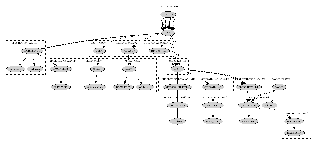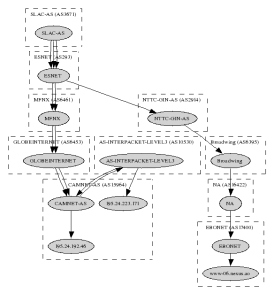...
The following Case Study of Sub-Saharan Africa was put together following the "2nd IHY-Africa Workshop" 11-16 November 2007, Addis Ababa, Ethiopia,
and the "Internet & Grids in Africa: An Asset for African Scientists for the Benefit of African Society", 10-12 December 2007, Montpellier, France. It contains most of the information presented plus much more background information.
We first discuss the current situation including infrastructure, capacity, costs and opportunities. We then discuss the Internet performance measured by PingER comparing Africa to the rest of the world, between sub-regions in Africa. We compare PingER measurements with other measures for capacity and throughput and for different development and corruption indices. We also look at routing and bandwidth utilization in Africa. We then go on to show some examples of the effect of the poor African performance and suggest some possible remedies. Finally we wind up with some conclusions. Appendices are included: on detailed measurements and routing per country; and further useful reading.
African Situation
Internet coverage and performance in the Sub Sahara region of Africa (see Figure 1, for the UN definition of the Sub-Sahara) is exceedingly poor. This is illustrated by the number of Internet connections per city worldwide seen in Figure 2 where it is seen that Africa stands out as almost lacking any (i.e. it is dark). Figure 3 illustrates how Africa has very little submarine cable connectivity (white lines) compared to the rest of the world.
...
- Poor performance affects data transfer, multi-media, VoIP, IT development & country performance / development
- DD exists between regions, within regions, within countries, rural vs cities, between age groups?
- Decreasing use of satellites, expensive, but still needed for many remote countries in Africa and C. Asia
- Last mile problems, and network fragility
- International Exchange Points (IXPs) needed
- Internet performance (non subjective, relatively easy/quick to measure) correlate strongly with economic/technical/development indices
- Increase coverage of monitoring to understand Internet performance and validate improvements
- Africa worst by all measures (throughput, loss, jitter, DOI, international bandwidth, users, costs) and falling further behind.
Appendix A: Interesting Trends:
- Sudan shifted from average RTT of approx. 685 ms to approx. 260 ms in Nov 2004. This is a classic case of shift from Satellite to Fiber. However there is are no remarkable trends visible in the throughput. This is explained by the increase in packet loss over the same period of time. Thus the improvement in rtt was compensated by the increase in packet loss and the overall throughput fails to show any meaningful increasing trend.
...
An interesting way to analyze the state of internet connectivity in Africa is to look at colored maps of various metrics as seen from our monitoring node in South Africa.
Ping Unreachability Packet Loss Min_rtt
Routing in Africa seen from SLAC
Using programs written to analyze traceroutes for different regions we have been able to generate topology maps of various regions in Africa as seen from SLAC. These maps provide a valuable insight into the various ASNs that are encountered as packets are routed from SLAC to Africa.
SLAC to West Africa SLAC to South Africa SLAC to East Africa
SLAC to Central Africa
Appendix B: Useful Links
ICT in Africa: a Status Report, Mike Jensen
West Africa Submarine cable Connection
Web Atlas of Regional Integration in West Africa
African Scientific Network
African Universities
Columbia University Africa Studies
Lowering the Cost of Internet Access in Africa
The bandwidth Initiative: Opening the power of the Internet to African Universities
University of Zambia Status.
Submarine Cables



